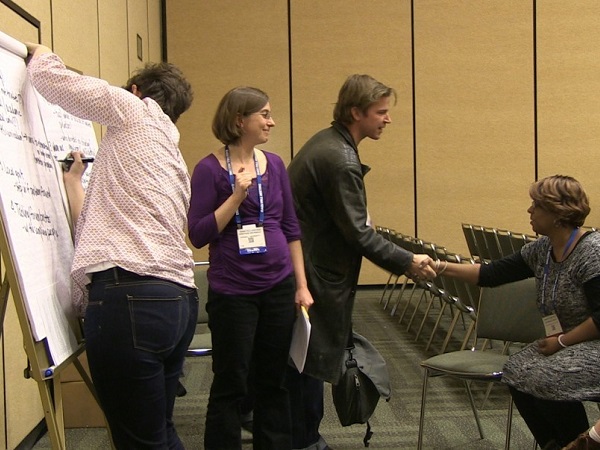Apply now to join our next cohort of Community Science Fellows and Community Leads!

In the last few months, the TNH2H team has presented their project findings at several conferences including University of Colorado-Boulder’s CU Engage program and at the 7th Living Knowledge Conference (LK7) at the Dublin Institute of Technology in Dublin, Ireland (June 2016). Below is their poster for CU Engage and the case study presentation and handout for LK7:
“Investigating Indoor Air Quality Using a Community-based Participatory Research Model”
Case Study: Challenges Beyond Data Analysis
Collier MS, Ashley, George Ware, Patricia G. Iwasaki MSW, LaShonn Billingsley, Michael Hannigan PhD and Deborah S. Main, PhD (December 2016) “Moving from Results to Action for an Indoor Air Quality Pilot Project” Poster presented at the meeting of the American Geophysical Union. San Francisco, CA.
The neighborhoods are very diverse in terms of race/ethnicity and income. Some of the neighborhoods can be described as food deserts with limited access to healthy affordable foods. TNH2H research has helped address this, including creating urban community gardens and changing city policies to allow the sale of produce from backyard gardens.
Taking Neighborhood Health to Heart (TNH2H) participants are interested in local air quality and its impacts on health; the quality of their drinking water; potential levels of soil contamination; and their Denver neighborhoods’ vulnerability to natural hazards and environmental change, especially climate change. Like many areas of Colorado and around the U.S., TNH2H neighborhoods must also respond to climate- and weather-related challenges, including long periods of drought and more recently extreme rainfall (Fall 2013 storm)
Taking Neighborhood Health to Heart (TNH2H) is a community-based participatory research project which began in 2006 and involves: five diverse urban Denver neighborhoods: Park Hill, Northeast Park Hill, East Montclair, Northwest Aurora and Stapleton; the University of Colorado Denver; and, the Stapleton Foundation. TNH2H residents are curious about the potential to detect any residual influence on air quality from historical activities in their formerly industrial neighborhood.
Currently TNH2H are looking for additional funding. If you have a contact or funding resource you would like to share, email us!

The Taking Neighborhood Health to Heart (TNH2H) team has made significant progress in the past several months. They have completed their data collection and now have radon and PERC (two volatile organic compounds) data for 15 homes in their study area. Their experiment used both high quality and low-cost methods so that they might compare the results of the two. The team kept the community involved, as they shared their newly acquired data with all participants of the study. They took the time to meet one-on-one with participants and answer any questions they had regarding results and recommended actions. The team plans to share results from their dosimeter tube experiments (the low-cost method) on Experiment.com’s journal site as soon as possible, so stay tuned!

Patricia Iwasaki, MSW, is a Taking Neighborhood Health to Heart Board Member. She has also served as Co-Chair of their Data Review and Dissemination Committee since 2010. She sits also on a food policy council appointed by the Mayor and two other food-focused boards. Her passion is health equity for low income and communities of color and community-based participatory research (CBPR). She has almost a decade graduate-level teaching experience, specializing in community practice, healthcare interventions and policy, and social work with chronically and terminally ill.
George Ware, MS, is President of the Board of Directors of Taking Neighborhood Health to Heart, Inc. Before retiring from the Colorado Department of Public Health and Environment, he supervised the STI/HIV Section’s Research and Evaluation Unit. With his involvement in Taking Neighborhood Health to Heart, he has focused his energies on supporting neighborhood residents in creating healthy communities through their participation in community-based participatory research initiatives.
Ashley Collier is an Environmental Engineering PhD student at the University of Colorado, Boulder. She works with an air quality research team on low-cost sensor quantification and exploring applications of next-generation monitoring technologies. She is interested in the potential these technologies have to further research, education, and citizen science.
(c) 2024 Thriving Earth Exchange